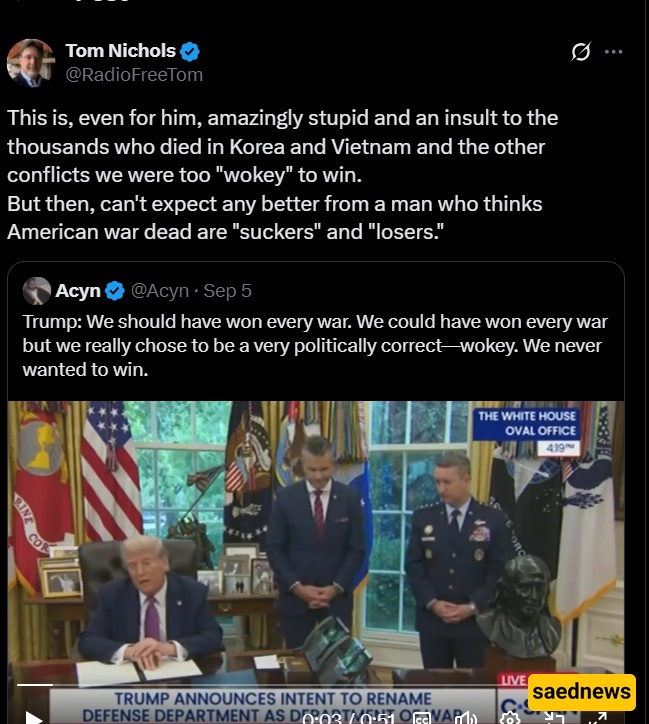SAEDNEWS: President Donald Trump ignited fresh ridicule online after claiming the U.S. lost wars because the country “chose to be very politically correct or wokey,” remarks made while he announced renaming the Pentagon the “Department of War.”


President Donald Trump used a high-profile speech announcing the rebranding of the Department of Defense as the “Department of War” to argue that the name change reflects more than semantics. He told listeners the shift is needed because, in his view, once the department became known as “defense,” the military adopted an attitude that favoured political correctness over decisive victory.

Trump invoked a historical shift: the federal department overseeing U.S. military affairs was officially the “Department of War” from 1789 until 1949, when its name changed to the “Department of Defense.” He suggested that renaming it back would restore a mindset oriented toward winning conflicts.

In his remarks the president made sweeping claims about America’s military record and motivations. “Really it has to do with winning,” he said. “We should have won every war. We could have won every war, but we really chose to be very politically correct or wokey and we just fight forever.” He added that the Department of War had “won World War I, World War II, as well as ‘everything before,’ and ‘everything in between,’” and argued that after the name change to “Defense” the country “never fought to win.”

Trump’s attempt to link military setbacks to “wokeness” quickly landed him in the crosshairs of social media. Clips of the speech circulated widely, and users on X and other platforms mocked the logic and historical claims. Screenshots, reaction videos and snarky threads amplified the moment — turning the speech into an instant viral topic.

While Trump framed his argument around semantics and cultural priorities, military historians and policy experts pushed back. For many observers, the causes of military success or failure are complex, involving strategy, resources, geopolitics and logistics — not a single rhetorical shift. One military expert quoted in coverage called the president’s comments “even for him, amazingly stupid,” reflecting the blunt tone of much of the expert reaction.
The Department of Defense-to-War announcement was theatrical and provocative by design, and it layered symbolic rebranding onto substantive policy rhetoric. That mix — a bold name change proposal plus a sweeping diagnosis of America’s past conflicts — helped ensure the speech would be dissected both politically and culturally.
Time | Event |
|---|---|
Speech day | Trump publicly announces renaming the Department of Defense to the “Department of War” and claims renaming reflects a change in attitude that led to military failure. |
Immediately after | Clips circulate on social platforms; users begin mocking and fact-checking the president’s historical and causal claims. |
Same day | Journalists quote experts — one called the remarks “even for him, amazingly stupid” — and social posts pile up with humorous takedowns and critiques. |

